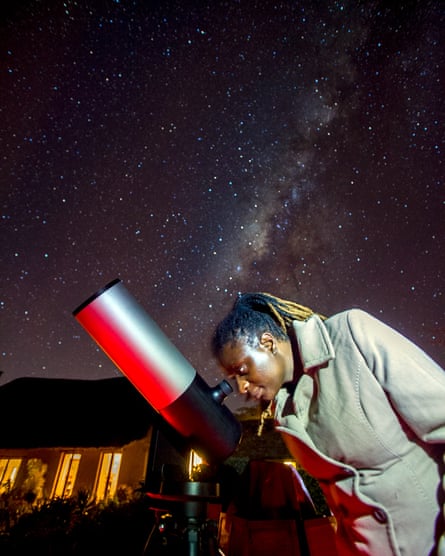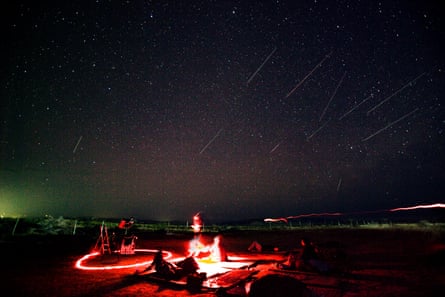19.09.2023

Susan Murabana estimates that she has shown the wonders of the night sky to more than 400,000 people since she set up her social enterprise, Travelling Telescope. ‘We hope these experiences can widen their views about the world and the opportunities beyond Kenya,’ she says. Photograph: Daniel Chu Owen
Susan Murabana’s passion for astronomy was only sparked in her 20s as science was just ‘for boys’. Now she tours Kenya with a telescope on a mission to reveal the cosmos to all children
It’s 1.30am in Kenya’s parched and sparsely populated north, and 50 people are lying on their backs on the shore of a dried-up river, staring up at the night sky. Thousands of stars create a vast, glittering canvas with the ghostly glow of the Milky Way clearly visible.
These stargazers have travelled 250 miles (400km) overland from Nairobi to Samburu county to witness the Perseid meteor shower – a celestial event that happens every July and August. They are not disappointed: every few minutes, arrows of light shoot across the sky like silent fireworks, prompting gasps and arm-waving as people try to pinpoint individual shooting stars.

The Star Safari is organised by a Kenyan astronomer, Susan Murabana, who has brought the SkyWatcher Flextube – a 50kg, 170cm-long telescope – to allow the group to view Jupiter, Saturn, Mars and Venus, and deep-sky objects such as the Orion and Trifid nebulae, star clusters and galaxies such as Pinwheel and Andromeda.
But here in Samburu, where light pollution is minimal and the air is warm and full of anticipation, the Perseid meteors – visible with the naked eye – steal the show.
“There’s something about the sky that makes you want to experience it with other people,” says Murabana, who launched Star Safaris in 2021. But this is not the only way she is sharing her passion and knowledge.
The proceeds from the £136 two-night trips, as well as monthly overnight excursions to the outskirts of Nairobi, fund the Travelling Telescope, a social enterprise set up by Murabana in 2014 that aims to educate remote communities and inspire a love of science and astronomy among young people, particularly girls.
Every two months, Murabana and her husband, Daniel Chu Owen, a photographer, load their telescope and an inflatable planetarium on to the roof of their 4x4 and set off to rural communities, where they give up to 300 children a chance to view the planets and learn about constellations and the basics of astrophysics.
“The challenge is that most children, especially in Kenya, have not had a chance to look through a telescope or visit a planetarium, and we are trying to change that. We hope these experiences can widen their views about the world and the opportunities beyond Kenya,” says Murabana who also runs kids’ space camps in Nairobi.
She estimates that she has shown the wonders of the night sky to 400,000 people since the launch of the Travelling Telescope. They primarily targets schools in remote areas because of the quality of the night sky and because of her mission to give children an opportunity that she wishes had been available to her.
“When I started this work, I didn’t see people who looked like me. I was a lone ranger and I wanted to change that,” says Murabana.
“There is a common misconception in Kenya that astronomy – and science in general – is hard, boring, for the west, and only for boys,” she adds. “I’d like to teach young girls that science is neither of these things and that they, too, can become astronomers like me.”
Murabana’s passion for astronomy began in her early 20s when her uncle invited her to join a similar outreach session at a school in Mumias, the small rural town in west Kenya where she was living. It was facilitated by Cosmos Education, a charity dedicated to improving science education in developing countries.

“That was a gamechanger. Looking through the telescope that day sparked my passion for the cosmos. If an outreach group had come to me when I was a young teenager, my attitude towards a career in science and astronomy would have been positive. I ended up studying sociology and economics, but maybe I would have aspired to be an astronomer.
“I now want to give children, especially African girls, the opportunity I missed,” she says.
Inspired by the Cosmos Education session, she joined the organisation as a volunteer; five years later she was invited to join Global Hands-On Universe, an educational programme set up by the International Astronomical Union. In 2011, she completed an online master’s degree in astronomy with the James Cook University in Australia.
When she met Chu Owen in 2013, during a Star Safari she was running, they decided to set up their own outreach programme.
Astronomy for development is an ambitious goal, she admits. It has been challenging to secure funding for her projects, especially in a country that has more pressing developmental needs such as access to healthcare, water and sanitation. About 90% of the Travelling Telescope costs are self-funded.
But its impact has gone beyond educating communities. In 2021, Murabana was selected as a Space4Women mentor, a UN programme that pairs women in the space sector with young girls aspiring to careers in science, technology, engineering and mathematics.
Murabana looked to Dr Mae Jemison, a former Nasa astronaut and the first black woman in space, as a role model when she was studying astronomy. Now she hopes her own work will inspire a generation of female African space scientists.
“I hope that one day, through this work, I will spark a chain reaction that leads to the first African woman in space.”
Quelle: The Guardian
